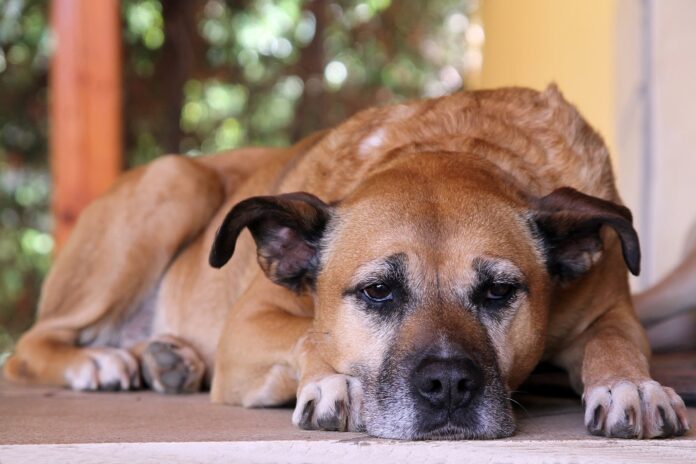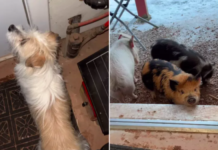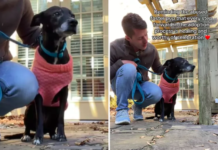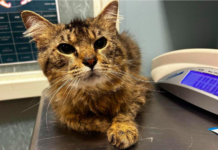Although several dogs vomit occasionally, frequent vomiting requires some care. Clear, brown, white, or yellow dog vomit is common. It may look foamy or not. There are a variety of reasons why your dog may vomit yellow bile.
What Causes Yellow Bile Vomiting in Dogs?
Stomach acids and bile are often seen in yellow-coloured vomit. To assist digestion, stomach acids are generated in the lining of the stomach. The gallbladder stores bile, which is generated in the liver. Bile enters the duodenum (the tube that connects the stomach to the duodenum) to aid digestion.
It’s possible that dogs vomit yellow liquid because their stomachs are empty. The stomach lining is irritated by gastric acids, leading the dog to vomit. This helps to explain why some dogs vomit when they are very hungry. However, dogs may vomit for a variety of reasons, so don’t discount your dog’s yellow vomit just yet.

It’s important to remember that yellow liquid isn’t always stomach acid and bile; it may also mean that your dog ate something yellow and couldn’t digest it.
There are a variety of causes for your dog’s yellow bile vomiting. Vomiting usually goes away on its own and isn’t a reason for worry. However, any kind of vomiting, particularly if it happens often, may signal a more severe disease.
- Indigestion (often due to dietary indiscretion)
- Obstruction of the gastrointestinal tract
- Toxin exposure
- Pancreatitis or similar gastrointestinal inflammatory disease
- Infectious illness
- Bilious vomiting syndrome
- Problems with the liver and/or gallbladder
What Should You Do If Your Dog Vomits Yellow Bile?
There’s no reason to be concerned if your dog vomits yellow bile just once. Keep an eye out for indications of sickness in your dog, such as lethargy, diarrhoea, lack of appetite, weakness, and other symptoms. If your dog seems to be generally healthy, keep an eye out for further vomiting. If your dog’s vomiting persists, postpone his next meal and keep an eye on him. After missing a meal, provide the next planned meal and continue to monitor for vomiting and other symptoms of sickness. If the vomiting persists, you should seek guidance from your veterinarian.
If your dog vomits more than twice in a 24-hour period or if daily vomiting lasts for many days, contact your veterinarian. Also, if any additional symptoms of disease develop, call your veterinarian.

Treatment for Dog Vomiting
Your dog will be thoroughly examined by your veterinarian beforehand. Discuss your dog’s recent and long-term medical history with your veterinarian. Include details about your current medicines and eating habits. Remember to tell your veterinarian about any plants, chemicals, or hazardous foods you suspect your dog has ingested.
Your veterinarian may suggest diagnostic testing to determine the cause of your vomiting. Blood and urine tests, radiographs (X-rays), and perhaps ultrasounds are examples of what this typically entails.
Anti-nausea medicines, antacids, and GI protectant pharmaceuticals are often used to begin treatment. To prevent additional vomiting, the initial doses should be administered by injection wherever feasible. Dehydration, pancreatitis, and infectious illnesses, for example, may need hospitalisation. While being monitored in the hospital, dogs usually get intravenous fluids and regular drug administration.
If the vomiting is caused by poisoning, your veterinarian will provide the toxin’s prescribed therapy. This may need hospitalisation.
If your veterinarian detects a GI blockage, surgery or endoscopy to investigate the GI system and remove the obstruction may be necessary. Post-operative treatment will need a hospital stay.

How to Keep Dogs from Vomiting
Keeping your dog away from things he shouldn’t eat, lick, or chew is the easiest approach to avoid vomiting. Of fact, since many diseases in dogs have no recognised origin, there are instances when vomiting is unavoidable.
The good news is that there are a few things you can do to reduce your dog’s chances of vomiting.
Every year, take your dog to the vet for a health checkup (or more if recommended by your vet).
Maintain a healthy diet and limit treats.
Plants, chemicals, human food, and other poisons should all be kept out of reach.
Prevent your dog from licking, gnawing, or ingesting potentially harmful items.
Remember to call your veterinarian as soon as you see symptoms of sickness; waiting can only make matters worse. If in doubt, go to the closest open veterinarian’s clinic.


















